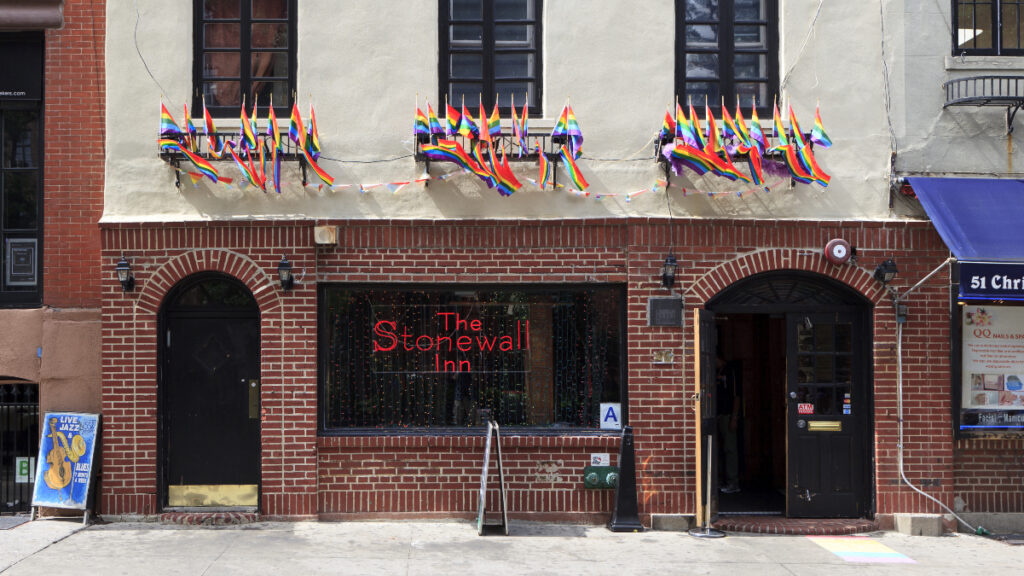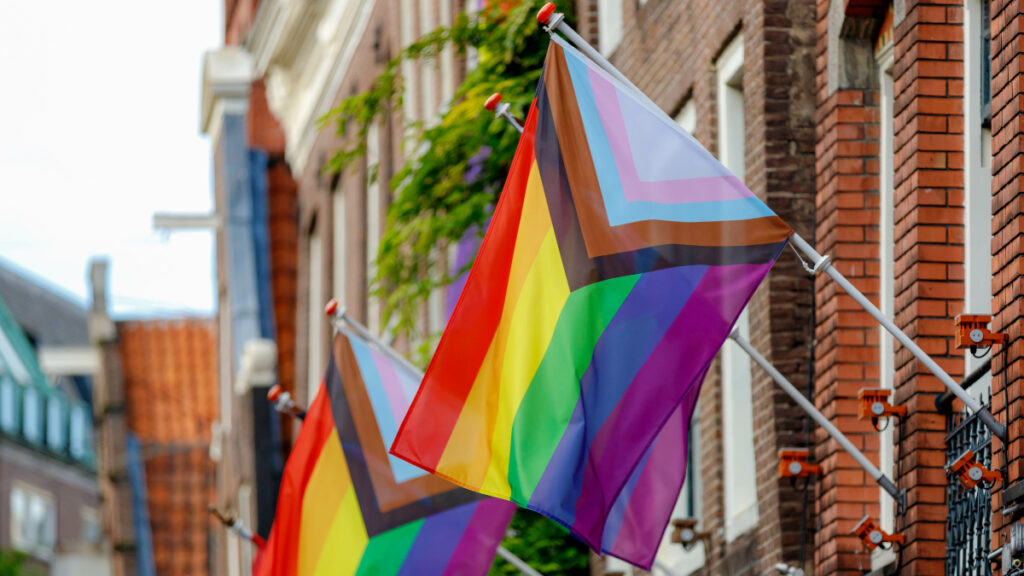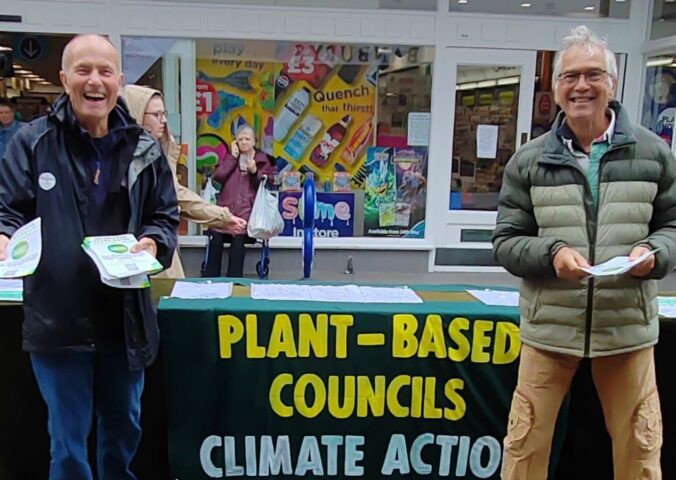LGBTQ+ people around the world are concluding celebrations of another annual Pride month. And there’s so much to celebrate.
Just this year there’s been significant progress in LGBTQ+ legal rights, particularly in the US following the inauguration of President Joe Biden.
But we still have a long way to go in affecting positive change regarding equal rights, respect, and education on a global scale.
We must keep fighting
Shockingly, there are currently 69 countries around the world that criminalize homosexuality.
Even the places which appear more accepting on the surface are crying out for education. And with it, acceptance and basic respect. It comes just days after a bisexual teen was beaten up in Liverpool, England.
In the same vein, while the vegan community is continuing to celebrate wins following skyrocketing popularity and progress in 2021 so far, the animal agriculture system reigns supreme.
Individuals may be ditching meat and dairy like never before (the percentage of vegans in the UK increased by 40 percent in 2020 alone). And brands may be bringing out streams of new plant-based products. But the global meat market is expected to continue its steady yearly rise of three-and-a-half percent: according to ResearchAndMarketing.com.
The meat industry is continuing to tear down rainforests, butchering hopes of a future free from ecological disaster as it rages on.
And countries are continuing to create and tighten laws outlawing homosexuality, while LGBTQ+ hate crimes are increasing in both the UK and the US.
So, without dampening remarkable advances as they continue to spark, we must keep fighting.
What is Pride?
Pride takes place in June each year. Marches and parades are organized to celebrate the LGBTQ+ community: from successes made in cultural acceptance to newly instated legal rights.
They’re also a symbol of hope and support, drawing queer people of all ages together alongside allies to show that no one is alone. Some of the world’s most iconic Pride events are taking place online this year due to the ongoing COVID-19 crisis, whilst others have been postponed.
Pride is a commemoration of the Stonewall Riots, which began in 1969 when police raided popular New York City gay bar – the Stonewall Inn.
This prompted an uprising following a history of police brutality and the formation of the Gay Liberation Front: a collection of organizations that fought for the rights of LGBTQ+ people.

At the time, the legal system was warring especially hard to diminish their rights. It was primarily transgender women of color at the forefront: including the likes of the famous activist Marsha P Johnson.
Trans people were disregarded by cis-gendered people within the LGBTQ+ community too. Nevertheless, the grassroots movements that formed became the bedrock of activism that carried through the HIV/AIDS epidemic and beyond.
It was the birth of Pride: it was by no means a celebration.
Pride 2021
In many places around the world, Pride is still met with fierce resistance. This year is no different.
Just this week at the Germany-Hungary Euro 2020 football match in Munich, Uefa blocked the Allianz Arena from lighting up in rainbow colors after Hungarian MPs voted to ban the promotion and depiction of homosexuality to under-18s.
In Florida this month, one person died and two others were injured after a truck rammed into attendees at a Stonewall Pride march.
The shocking incident is being described as ‘deliberate and premeditated’ – but has not yet been labeled a homophobic attack by police officials.
Rainbow-washing during Pride
And then there’s the other side of the spectrum: rainbow-washing.
“What’s not cute is giving more than $150,000 to Mitch McConnell and other GOP Senators who are actively blocking the Equality Act from becoming law.”
Pramila Jayapal, US Congresswoman
Come June, corporations will lead you to believe it’s all one big rainbow party. This can involve performative acts such as a lick of paint on a logo, the sale of bright merchandise or the posting of idle memes.
Rainbow washing, as it’s become known, is prolific. And it’s confusing for consumers.
Ultimately, the practice is when a company profits off the LGBTQ+ community without supporting it. Worst still, some corporations are actively trying to diminish gay rights.
Several examples were called out by US Congresswoman Pramila Jayapal this month.
She publicly wished The Bank of America, Wells Fargo, Raytheon Technologies, and Walmart a ‘happy pride’. Her applaud, however, was laced in condemnation.
The satirical remarks were in response to the corporations donating thousands of dollars to Mitch McConnell, she claimed. For reference, McConnell is a controversial Senator who has consistently voted against legislation seeking to improve the lives of LGBTQ+ people.
Rep. Jayapal posted: “Woah, CUTE Pride logo!
“What’s not cute is giving more than $150,000 to Mitch McConnell and other GOP Senators who are actively blocking the Equality Act from becoming law.”
A Forbes report in 2019 declared that nine of the ‘biggest, most LGBTQ+ supportive’ US corporations gave over $1 million to anti-gay politicians.
Green-washing
Similar to rainbow-washing, stamps of sustainability can be pressed by companies whose actions tell a very different story.
Nestlé is a prime example.
Despite bringing out the much-awaited vegan KitKat this year, many vegans boycott the brand for the slew of accusations against it. They include involvement in child labor and deforestation. Additionally, allegations surfaced over the baby milk scandal of the 70s that saw the discouragement of breastfeeding and reports of increased deaths among infants.
It’s a problem because it leads us to believe that positive changes are happening, ignorant of what’s beneath the surface.
However, many vegans are acutely aware of corporate hypocrisy: they refuse to buy plant-based products from big companies that continue to profit off animal agriculture.
Take food giants, Burger King for example. While the chain is moving towards heavily plant-based menus, it boasted profits hiking £1.5 billion last year – sales from the direct killing of animals.
We should also question Burger Kings’ public support of LGBTQ+ rights.
This month, the food giant declared it would contribute 40 cents for every chicken sandwich sold to Human Rights Campaign – the largest LGBTQ+ civil rights organization in the US. It comes after a slew of evidence linked the fast-food chain Chick-fil-A with anti-gay organizations.
Should we applaud Burger King for supporting queer people while it continues to sell tonnes of meat?
After all, the money comes directly from slaughter, and the chain is potentially profiting off Pride sales…
How is the vegan movement connected to LGBTQ+ people?
There are clear intersections in the queer and vegan communities.
“Many animal rights activists support the LGBTQ+ community, and vice versa because we identify with those subjected to society’s ignorance and arrogance.”
Dan Matthews, PETA
There’s a cultural link that surrounds the morality and compassion for others that comes with abandoning the cruelty of the meat industry.
For many LGBTQ+ people, following a vegan lifestyle is as much a part of their identity as being queer.
Senior Vice President of Campaigns at PETA US is Dan Matthews, who has long spoken about the connections between the two.
Matthews told PBN: “Many animal rights activists support the LGBTQ+ community, and vice versa because we identify with those subjected to society’s ignorance and arrogance.
“Being bullied as a gay teen not only gave me the thick skin that comes in handy when rocking the boat as an activist. It also opened my eyes to other victims of bigotry and narrow-mindedness.
“Whether we have feet, paws, feathers, or fins, we all deserve respect and compassion. And what better occasion than Pride Month to be reminded of that?”
The vegan and LGBT+ community share a passion for fighting for a better world. And there’s been significant progress made in both spaces that indicate a compassionate future.
Causes for celebration this Pride
Since the Stonewall Riots, there have been monumental improvements in terms of LGBTQ+ rights. And we should celebrate them.
For example, same-sex marriage is now legalized in 29 countries, since the Netherlands led the change in 2001.
Last year, Botswana decriminalized gay sex, while activists from Jamacia to Russia continued their fight to overturn multiple laws restricting queer relationships.
By the end of 2020, 81 countries had laws against LGBTQ+ workplace discrimination, a huge increase on the meager 15 in place just 20 years ago.
Moreover, earlier this year, on the first day of his presidency, President Joe Biden signed a historic executive order. It orders every federal agency to clarify that civil rights laws prohibiting sex discrimination also prohibit discrimination on the basis of sexual orientation and gender identity.
He later signed an executive order to reverse the Trump-imposed ban on transgender people serving in the US military.
Growing vegan movement
Equally, veganism is celebrating recent wins.
The movement has seen soaring popularity, from record Veganuary sign-ups to skyrocketing sales of plant-based products. For example, the number of companies listed using the Vegan Trademark has seen a staggering rise of 128 percent.
Moreover, companies and analysts all over the world are reporting booming demand, from Germany to Australia.
And, it continues to grow.
High-profile celebrities are injecting billions into the progression of plant-based meat alternatives, and start-ups are ramping up cell-cultured meat production.
More people are reconsidering their food choices thanks to inspiring activism, including films such as Seaspiracy: either reducing their meat consumption or completely cutting it out.
Persuading particularly stubborn family members to make the switch is getting easier as the horrors of animal agriculture unfold.
Staggering climate change predictions make it difficult to ignore. The animal agriculture industry is responsible for at least 14.5 percent of greenhouse gas emissions, for example.
At last, the meat industry can no longer hide.
Vegan generation?
And it’s young people who are leading the charge.
Gen-Zs are just as likely to lean towards a meat-free diet as millennials. And, they are also more conscious about their health and the environment.
Ultimately, that bodes well for the vegan movement. This is due to the scientific evidence confirming plant-based diets may be both beneficial for your health and the planet.
Younger generations are also more passionate about protecting our environment and tackling the climate crisis. According to figures compiled by Amnesty International, Forbes reports, 40 percent of respondents cited climate change as their biggest fear.
The likes of teenage climate activist Greta Thunberg are inspiring pillars of the next generation to take action.
Similarly, Gen-Zs are more likely to be queer. This is according to research published by Britain Thinks which states they aren’t as likely to identify as heterosexual or cis-gendered.
Moreover, the data claims they’re also more likely to have ‘a strong sense of social responsibility’. Within this, they prioritize gender equality and diversity over older generations.
It’s not enough
However, it’s important that we don’t forget: more than 75 billion animals are slaughtered year on year.
And, the land used to farm those animals takes up 85 percent of all agricultural land globally. Despite this, it provides less than 20 percent of the calories we consume.
Moreover, homosexuality is still outlawed in over 69 countries worldwide. And deemed unacceptable on a wide scale. This is reflected in the laws and attitudes across the Middle East, Africa, and in Europe.
Homophobia still riddles political systems and businesses all over the world. And, in some countries, it is punishable by death.
In the US, prolific anti-gay groups such as the Liberty Counsel and National Organization for Marriage seek to taper equal rights progress: filing lawsuits to block marriage equality and LGBTQ+ education.
Meanwhile, in the UK, the government is receiving heavy criticism over delays to ban conversion therapy.
Promises made under Theresa May’s government three years ago are yet to be delivered. The practice rages on despite proven research that it can lead to increased rates of depression and suicide.
Crimes of hate
LGBTQ+ hate crimes are actually increasing in both the UK and the US. And it’s endemic in Europe, too.
In Poland, political and religious leaders are fighting to scale back rights. For example, LGBTQ+ couples are barred from adopting children together.
A senior political figure even branded the LGBTQ+ ‘ideology’ as ‘alien’ to Polish identity and culture. And that was just a few months ago.
As mentioned, this Pride, the Hungarian Parliament voted 157 votes to one in favor of shocking anti-gay legislation. The new law sees content deemed to promote homosexuality or gender change banned from under-18s.
The world is a dangerous place to be queer.
More than 28 transgender people were killed this year alone. These horrific figures make 2021 on track to be the deadliest on record for anti-trans violence.
Additionally, LGBTQ+ youth are more likely to take their own lives than their heterosexual counterparts.
According to the US suicide prevention organization The Trevor Project queer young people also more likely to face verbal and physical harassment.
LGBTQ+ people still fight daily for mere acceptance, safety, and respect. Their voices are diminished and disregarded at home, on the streets, and in the media.
And so, when celebrating Pride we must fight for them.
What we can do
It isn’t about despairing about the complicated world we live in. Atrocities are ongoing, and there won’t ever be a magic switch to prompt people to become more accepting of LGBTQ+ people. Equally, there isn’t a quick-fire solution to end the suffering of animals, and the ecological disaster threatening our planet.
But when you fly the rainbow flag for Pride month and you cast your mind back to how far we’ve come, think of the road ahead.
Whether it’s supporting charities, raising voices, or starting difficult discussions: there is always something we can do.
We have to keep protesting and marching for our future.






